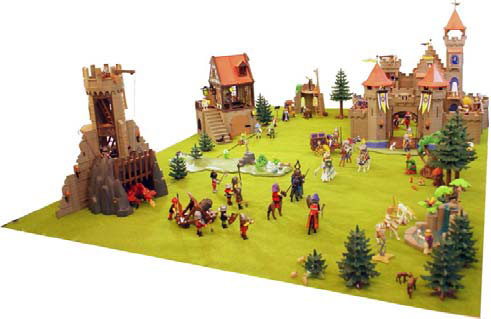|
Augmented Knight's Castle (L)Status: Abgeschlossen
BackgroundAugmented toys have the potential to combine the best of two worlds: the real, physical world and the virtual world, respectively. While traditional toys allow for socializing and the benefits of tactile sensation, they are limited in their capabilities of providing the players with sensory immersion and support for complex interactions. Virtual toys (i.e., video games) on the other hand, are able to design fully artificial worlds using elements of graphic novels or movies that can individually interact with the players, yet they typically lack haptic feedback and often limit social face-to-face interaction with other players. Adding virtual elements to traditional toys promises to combine these two paradigms to their respective advantage, thus resulting in engaging augmented play environments (ATEs). The Augmented Knight's Castle (AKC) is an ATE resembling a medieval world. Employing pervasive computing technologies such as radio frequency identification (RFID) technology, the AKC is a traditional Playmobil Middle Ages play set that is capable of detecting the figures as they are placed on and moved within the game environment, and reacting accordingly. Location information of individual figures is utilized to provide them with custom sound effects and verbal commentaries, based on their current and past locations. Additional effects such as light or smoke further enrich the play experience of the children and let the play set come alive. For example, if the dragon is taken out from the dungeon beneath the dragon tower, its exiting is accompanied by red light, smoke, and a roaring sound. See also:
ObjectivesWe are looking for one or two capable students to implement two AKCs: one very basic version for our demo lab and an extended version for the University of Sussex, where the latest user studies took place. The extended version is supposed to be developed partially at the University of Sussex (https://www.lifesci.sussex.ac.uk/research/chatlab/), where the AKC will be further tested. To this end, the students are required to travel to the UK for several weeks for the implementation of the AKC as well as training the psychologists how to use it. Traveling costs and accommodation will be provided for. This project is a great opportunity to learn about software development, RFID systems, interface design, interdisciplinary work, and user studies. Requirements
Contact/Ansprechpartner: Alexander Bernauer |
|
|